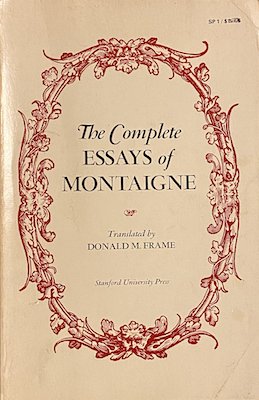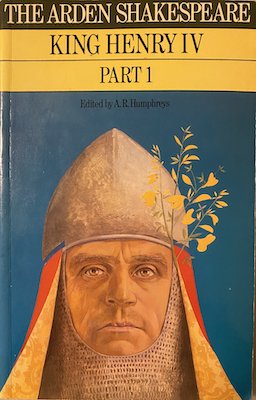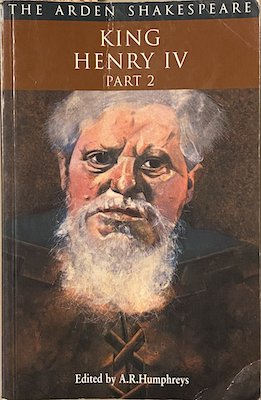Sub Specie Aeternitates is the way that the early modern philosopher Baruch or Benedict de Spinoza (1632-1677) describe third-order knowing. That is, it is a knowing according to a species of eternity, as it has variously been translated.
I won’t dare to try to explain that, except to say that it is inadequate to say that it is a knowledge separate from time.
Clever me has so described the 31 days of 16th-17th-century reading that I will be recording during May 2023. Spinoza would fall into this huge category, being born in 1632, amidst the madness of the 30 Years War, and dying at the ripe age of 45 in 1677 (tubercular?).
The Texts From Which I Read
Shall begin and repeatedly return to the Essais of Michel de Montaigne* and The Metaphysical Poets (edited by Helen Gardner and published by Penguin Classics). Have also been reading the second edition of the Arden Shakespeare King Henry IV, Part 1 and Part 2 (both edited by A.R. Humphreys).
If you’re interested in reading some of the Essais, the American philosophers Jonathan Bennett and others have completed and collected many translations of early modern texts, and the Essais is one of them.
I have two different versions of the Essais. The older is a cheaper abridged Penguin edition. The newer — purchased only at the end of April — is the Stanford University Press edition. It is complete, although it seems lacking resources that a newer version has likely included.
Why Are They Called Essais/Essays?
To gesture to the French meaning of the title, which catches a valence lost in the pedestrian English Essays [to be spoken with a funny bucolic accent].
The person who tests a mining find to determine if it is actual gold or silver is called an assayer, and this is probably the one remaining sense of the French word from which is derived.
Namely, the word means to try or to test.
Montaigne is essaying himself, testing himself. The Essais are sometimes categorized as philosophy and sometimes as essays, but neither of those categories is sufficient.
Montaigne’s a philosopher because of his skepticism, but the work is meant to be personal as he makes explicit in his comments to the reader:
If I had wanted to seek the favour of the world, I would have decked myself out in borrowed beauties. Here I want to be seen in my simple, natural, everyday fashion, without cunning or artifice, for it is my own self that I am painting.
April 29th (Day -1)
Cephalus explains how old age permits the settling of accounts (in the beginning of Plato’s Republic), but Montaigne speaks of several instances when individuals allow death to excuse actions and broken promises.
This poem by Robert Southwell presents a unique view of Mary Magdalene’s pathos before the cross. For more on this and two other poems by Southwell.
Speaking of suffering, Southwell suffered before death, by which I mean that he was a Catholic in 16th-century England. His torturer, Richard Topcliffe, had hopes of hanging, drawing, and quartering him (Southwell’s friends hung on his legs during the hanging to keep him from the drawing … ). This poem explores how Mary Magdalene suffered after Christ’s death.
April 30th (Day 0)
In which we come to understand that sometimes we gain mercy through solicitation, other times only through defiance.
But this begins a series touching on how honorable deaths are achieved.
May 1st
The second of the Essais addresses sadness not as a mere psychological condition (a modern view), but as an object worthy of ethical reflection.
If you’re a philosopher, you might ask a seemingly incoherent question like, what is the use of sadness? Another way to approaching it philosophically would be to ask what effects does sadness have.
The first question appears to be as strange as asking what is the use of appetite. The obvious answer — it is part of the process by which our bodies to maintain themselves — actually does not answer the question. Similarly, to say that sadness is the way we emotionally process an event in which our desires were thwarted is also not the answer the question.
The second question is slightly better, although the temptation is to answer, nonsensically, it allows us to feel sad. One better answer is that it is a condition in which we are unable to act. Another might be that it permits us insight into the weight of our relations with other people, sometimes tacit, sometimes latent.
The author claims to be free of this passion.
William Alabaster’s poem describes how divine donation (gift, God’s emanation) finds no limit [until] it makes a finite man omnipotent.
To be clear, this seems like a limit to God’s power, because God is effectively unmaking himself. Making the infinite finite.
A little history:
William Alabaster was an Anglican. Remember that one’s religious identification was grounds for a life of success or misery during this historical period. Less than a century before, to be a non-Catholic was grounds for no one less than Thomas More to seek you out and torture you. Whereas, when William Alabaster lived, up was down and black was white: to be a Catholic was reason for persecution in England.
Alabaster grows up in this milieu and still he converts to Catholicism. He suffered Topcliffe’s wrath, but his friends, unlike Southwell’s, were unable to enable him to avoid drawing and quartering.
May 2nd
Fear, desire, hope, impel us towards the future; they rob us of feelings and thoughts about what is, in order to preoccupy us with what will be — including what will be when we no longer exist.
May 3rd
Just as fallow lands, when rich and fertile, are seen to abound in a hundred thousand different kinds of useless weeds, so that to make them do their duty we must subdue them and keep them busy with seeds chosen for our service; and just as women left alone are seen to produce shapeless lumps of flesh, and need to be fertilised by another seed to produce good natural offspring; so too with our minds.
For whatever reason I cannot read this passage and not here “no you didn’t!”
Shapeless lumps of flesh? I dare surmise Montaigne speaks of menstruation?
The principal danger of idleness is the permission granted the imagination.
A historical poem (albeit not at the time) written about Elizabeth Stuart (1596 – 1662) was Electress of the Palatinate and briefly Queen of Bohemia as the wife of Frederick V of the Palatinate.
Wotton played a diplomatic role on the part of Elizabeth’s father, King James IV (and I) to assist Elizabeth in whatever way possible.
So, when my Mistris shal be seene
In form and Beauty of her mind,
By Vertue first, then Choyce a Queen,
Tell me, if she were not design’d
Th’ Eclypse and Glory of her kind.
May 5th
In which the author complains about his inadequate memory and the way in which it has led him to seem to lie.
But this is still better than being unable to stop lying: “they go on fiddle-faddling and dragging along like men fainting from weakness.”
Don’t you know that fortune is fickle?
Aristotle’s Nicomachean Ethics even allows that after our deaths our happiness can be affected by the fortunes of our loved one. But Montaigne’s view is more deeply in touch with human experience (and there’s something funny about this because the next essay is “That to philosophize is to learn to die”).
Montaigne evinces example after example of individuals suffering at the end, like Priam, Ludovico Sforza, and Mary Stuart.
Fortune sometimes lies in wait precisely for the last day of our life, to show her power to overturn in a moment what she had built up over many years [ … , which is why, i]n judging the life of another, I always observe how it ended
May 6th
It is not hyperbole to say that this essai is at the heart of so many reflections, as should already be intuited. For the imagination is at work in the liar and in the idle.
Or so one might think. In fact, Montaigne claims to be no liar and certainly does not think himself idle. But he is a profound victim of the power of the imagination: “I am one of those who are very much influenced by the imagination.”
A not-accidental detour involves how certain members do not work when they are needed and work when they are not needed, as a result of the imagination: “People are right to notice the unruly liberty of this member.” Also, that one has grown horns in his sleep after dreaming thereof. That a woman became a man on her/his wedding day.
“But all this may be attributed to the narrow seam between the soul and the body …”
“Tortoises and ostriches hatch their eggs just be looking at them, a sign that their sight has some ejaculative virtue.”
“To me, magicians are poor authorities.”
“My conscience does not falsify one iota; my knowledge, I don’t know.”
May 7th
Which is answered by the succeeding essay.
May 8th
If you haven’t given thought what you’re talking about, you might be like a speaker like Cassius Severus, who was quite gifted.
Montaigne has experienced this, but equally its opposite. Has no insight into this matter.
What you will learn of Montaigne is that he is not of constant character and all of the principal virtues of the Western intellectual tradition neither belong to him nor describe anyone who has existed, in his view. He’s a postmodernist before the fact.
May 11th
This is a famous essay by our author, yet it is strangely left out of Penguin’s abridged version.
May 12th
Here is Montaigne’s account of human nature.
Lived on a song, they say.
Lived on a song, they say.
Lived on a song, they say.



